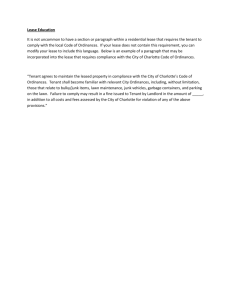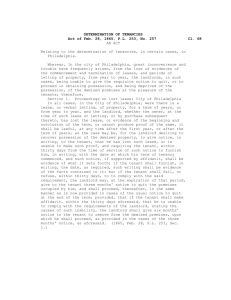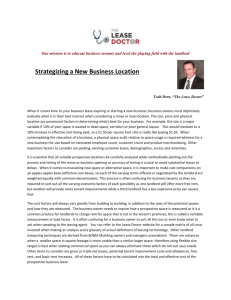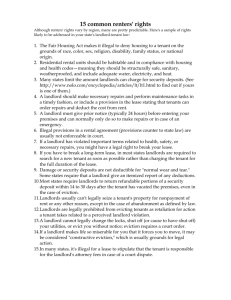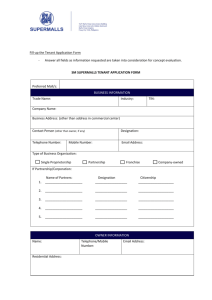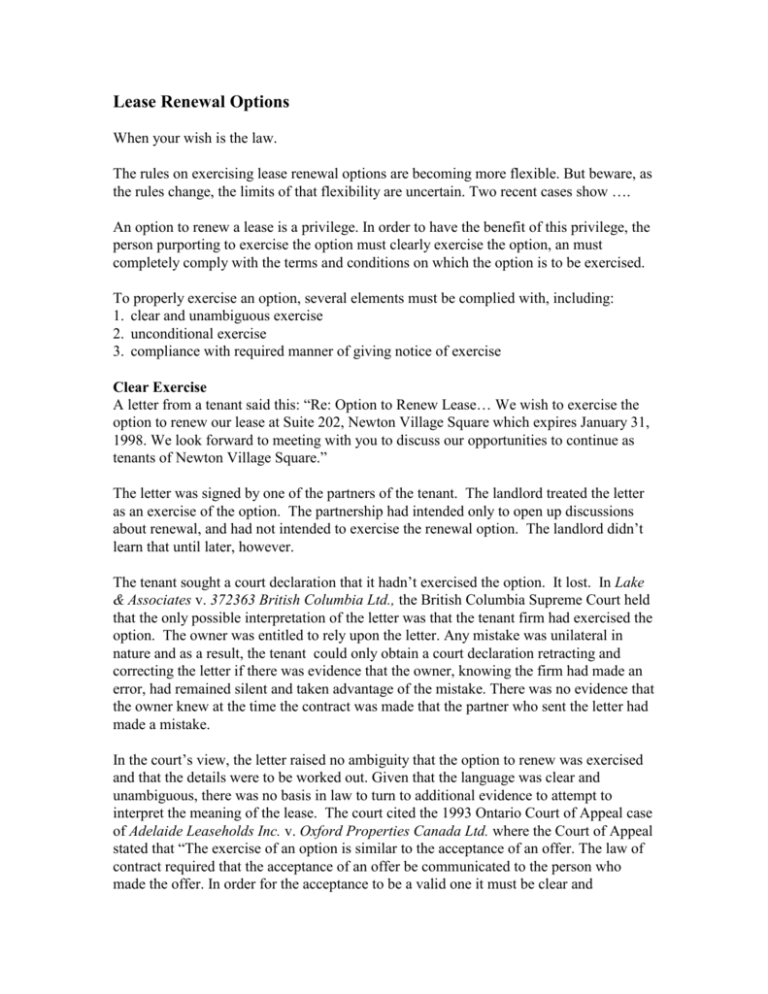
Lease Renewal Options
When your wish is the law.
The rules on exercising lease renewal options are becoming more flexible. But beware, as
the rules change, the limits of that flexibility are uncertain. Two recent cases show ….
An option to renew a lease is a privilege. In order to have the benefit of this privilege, the
person purporting to exercise the option must clearly exercise the option, an must
completely comply with the terms and conditions on which the option is to be exercised.
To properly exercise an option, several elements must be complied with, including:
1. clear and unambiguous exercise
2. unconditional exercise
3. compliance with required manner of giving notice of exercise
Clear Exercise
A letter from a tenant said this: “Re: Option to Renew Lease… We wish to exercise the
option to renew our lease at Suite 202, Newton Village Square which expires January 31,
1998. We look forward to meeting with you to discuss our opportunities to continue as
tenants of Newton Village Square.”
The letter was signed by one of the partners of the tenant. The landlord treated the letter
as an exercise of the option. The partnership had intended only to open up discussions
about renewal, and had not intended to exercise the renewal option. The landlord didn’t
learn that until later, however.
The tenant sought a court declaration that it hadn’t exercised the option. It lost. In Lake
& Associates v. 372363 British Columbia Ltd., the British Columbia Supreme Court held
that the only possible interpretation of the letter was that the tenant firm had exercised the
option. The owner was entitled to rely upon the letter. Any mistake was unilateral in
nature and as a result, the tenant could only obtain a court declaration retracting and
correcting the letter if there was evidence that the owner, knowing the firm had made an
error, had remained silent and taken advantage of the mistake. There was no evidence that
the owner knew at the time the contract was made that the partner who sent the letter had
made a mistake.
In the court’s view, the letter raised no ambiguity that the option to renew was exercised
and that the details were to be worked out. Given that the language was clear and
unambiguous, there was no basis in law to turn to additional evidence to attempt to
interpret the meaning of the lease. The court cited the 1993 Ontario Court of Appeal case
of Adelaide Leaseholds Inc. v. Oxford Properties Canada Ltd. where the Court of Appeal
stated that “The exercise of an option is similar to the acceptance of an offer. The law of
contract required that the acceptance of an offer be communicated to the person who
made the offer. In order for the acceptance to be a valid one it must be clear and
unambiguous.” The court also rejected the argument that the word "wish" means "a
desire at a future time to exercise the option". As a result, the court held that the exercise
of the option had been clear and unambiguous, when considering the letter as a whole.
Unconditional Exercise
Non-compliance with the technical notice requirements of the lease did not negate the
notice, as the requirements were not mandatory. A facsimile actually received by the
other party constituted adequate notice. The delivery of the keys to the maintenance man
did not constitute surrender of the premises. The maintenance man had been instructed
not to accept the keys and only did so when the plaintiff continued to attempt to hand
over the keys.
BENNETT J.:-- The plaintiff leased office premisesa t the Newton Village Shopping
Centre in Surrey, B.C. from Adams Coscan Partners on November 4, 1992. The term was
five years with a renewal option. It expired the 31st of January1998.
In April, 1996 the defendants took over ownership of the Newton Village Shopping
Centre. At that time, all the tenants, including the plaintiff, were provided with a letter
advising them that A.L. Sott was the new owner and provided them with a new address to
send payment, numbers for enquiries for any problems with the property. The letter also
indicated that any insurance certificates should be amended to reflect the new owner. The
lease itself stated that the address of the landlord was the address of Adams Coscan &
Partners. The lease was not amended to reflect that A.L. Sott was the new owner.
The option to renew is set out in Schedule F of the lease and states as follows: If the
Tenant performs all the Tenant's covenants and is not in default under any of the terms of
the Lease, the Tenant shall have the right to renew the Lease with respect to the Leased
Premises and any additional space leased for an additional term of five (5) years on the
same terms and conditions, save only for the Minimum Rent and that there will be no
further right of renewal. The Rent during the renewal period shall be the fair market Rent
for the Premises without regard to the Leasehold Improvements of the Tenant, excluding
those paid for by the Landlord, agreed between the parties, and failing such agreement, as
determined by arbitration pursuant to the Commercial Arbitration Act of British
Columbia. However, the Minimum Rent shall not be less and the Minimum Rent payable
in the last year of the Term. To exercise this right, the Tenant shall give written notice to
the Landlord no earlier than seven (7) months and no later than six (6) prior to the date of
expiry of the Term, otherwise this Option to Renew shall be deemed waived.
letter.
(i)
Was the letter a conditional notice?
(ii)
Was the letter ambiguous and uncertain?
(iii) Was the letter sent in error and therefore rectifiable in equity?
(iv)
Is the option void to due a unilateral mistake of Steven Lake?
(v)
(vi)
(vii)
Is the option to renew void because of "non est factum" in that Steven Lake was
over worked and not in good health at the time the document was prepared and
signed?
Was the option to renew devoid for failure to comply with the specific renewal
terms of the lease, i.e. sent by registered mail and sent to the address for the notice
contained in the lease?
Did the defendants actually or constructively terminate the lease by permitting the
plaintiff to return the keys and requiring an inspection of the premises?
The plaintiff seeks a declaration that the lease was not renewed and that the lease expired
on January 31,1998. If it was renewed then it submits the defendants have re-taken
possession and terminated the lease.
I heard two days of submissions and have been referred to many authorities on the issues
raised before me
The plaintiff argues that the letter sent to the defendants was a conditional acceptance. He
argues that the word "wish" is ambiguous, and the words "to meet with you" and" to
discuss", "opportunities to continue as tenants" and" please ... arrange a meeting time" all
suggest that the letter was a conditional expression of a desire to exercise the option at a
future time if the terms were agreeable .Further, the plaintiff submits that the letter should
be viewed as a whole.
Reading the letter of July 2, 1997, I am satisfied that the only possible interpretation and
the interpretation a reasonable person reading the letter would arrive at is that Lake &
Associates have indicated that they want to exercise the option to renew the lease. In the
original lease agreement the terms were to be set by an arbitrator if the terms could not be
agreed upon. Whether Mr. Lake acted carelessly or without authority of his other partners
is irrelevant. Mr. Silber was entitled to read that as the exercise of the option to renew and
to rely on it.
RECTIFICATION
The plaintiff argues that if the document was a notice to exercise the option to renew then
because the notice was given in error equity should intervene to cancel it.[para24] In
order to succeed in rectification of a contract, the plaintiff must meet a high onus of
proof. The law is clear that the remedy of rectification is to be used with great caution and
only in the face of "clear and convincing proof" or "beyond a fair and reasonable
doubt".(See Norman Estate v. Norman (1990), 43 B.C.L.R. (2d) 193 at204 (B.C.S.C.) and
the cases cited therein). Rectification is normally invoked to correct a mistake in a
contract where the evidence is "clear and unambiguous" that a mistake has been made and
that the contract does not represent the parties' common intention. However, the plaintiff
in this case seeks rectification based on a unilateral mistake. The remedy of rectification
in these circumstances must rely on a finding of" fraud, constructive fraud, or of some
degree of unconscionability" on the part of the defendant when the contract was entered
into. (See Farmer Construction Ltd. v. The Corporation of the District of Surrey (5 June
1997)Victoria Registry [1997] BCJ No. 1332 B.C.S.C.) where Spence rJ. referred to a
number of authorities including Windjamme rHomes Inc. v. Generation Enterprises
[1989] BCJ No. 278B.C.S.C., and said at paragraph 19:In the Windjammer case, the
equitable fraud was found to consist of the fact that the defendants unilateral mistake was
of such a character as to be obvious to a reasonable person and that taking advantage of it
would amount to equitable fraud: see page 7. At page 5 of that decision, the learned judge
had already stated that: To be characterized as "equivalent to fraud" then, constructive
knowledge of the mistake is required. Implicit in finding constructive knowledge, where
possibly as a second element of equitable fraud, is that the parties seeking to enforce the
contract acted in such a way as to gain an advantage unfairly or in bad faith.
Spencer J. also referred to the decision of McLachlin C.J.S.C. (as she then was) in First
Capital City Ltd. v. British Columbia Building Corp. [1989] BCJ No. 130,where she held
that: equitable jurisdiction to relieve against a mistake comprehends situations where one
party knows or ought to know of another's mistake, remains silent and snaps at an offer,
seeking to take advantage of the other's mistake
Thus, an equitable remedy is available to correct a unilateral mistake wherein one party,
knowing the other has erred, remains silent and takes advantage of the mistake.
The plaintiff argues that Mr. Silber was aware or had constructive knowledge that the
mistake was made. H epoints to the fact that Silber knew sometime before July of1997
that the plaintiff was looking at other premises. He states that a clarification was given
before the expiry of th eperiod for given notice on July 31st. He says there was ample
opportunity for the defendant to find a new tenant and that there was no evidence that the
defendants relied on the July2nd letter to their detriment or prejudice in any way. He
points out s. 44 of the Law and Equity Act that states where the equity and common law
conflict, equity prevails.
The difficulty with the argument is that there is no evidence that at the time that the
contract was made on July 2nd, Mr. Silber knew that Mr. Lake had made a mistake. The
fact that Lake & Associates were looking at other premise is irrelevant. The parties did
not tell Mr. Silber they were looking at other premises. The word may have gotten to Mr.
Silber by way of a real estate agent. The evidence is equivocal on this point. Even if the
real estate agent was firm in his evidence that he told Mr. Silber, that is wholly irrelevant
given that on July 2, 1997 Steven Lake clearly exercised the option to renew. Silber was
entitled to assume that they had decided to stay with his premises.
The argument that there was a unilateral mistake of which the defendants had
constructive knowledge of and took advantage of fails.
NON EST FACTUM
There was some evidence from Steven Lake that he was very busy, not feeling well and
his secretary drafted the letter at his instruction, which he signed. There is no medical
evidence tendered that suggests that Steven Lake did not have an operating mind when he
signed the letter. The plaintiff simply cannot rely on the defence of non est factum.
Steven Lake was the author of the document, he read it and he signed it. Whether he
signed it through carelessness or negligence is neither here nor there. The plaintiff cannot
rely on this defence.
NON-COMPLIANCE WITH THE TECHNICAL REQUIREMENTS OF
THE LEASE
The plaintiff argues that the fact that they did not send their notice by registered mail and
they sent it to the address of A.L. Sott instead of the address of the former owner in the
lease negates the notice. The notice was sent by facsimile to Arnold Silber.
This issue was dealt with by Campbell J. in Masters Realty Inc. v. Bellevue Properties
Ltd. supra. He referred to the decision of Ross v. T.E. & Company (1992), 96DLR (4th)
631 (at 638) Ont. C.A. as follows:.... if an offeree wishes to depart from the method of
acceptance prescribed by the offeror (which is not insisted on as the sole method of
acceptance), he or she can only do so effectively if the communication is by a method
which is not less advantageous to the offeror and the acceptance is actually
communicated to the offeror.
Campbell J. also refers to a similar case of Canada Safeway Ltd. v. A. Schiel
Construction Ltd. (1993), 34R.P.R. (2d) 320 B.C.S.C. at 323 where Macdonald J. said:
The only issue here is whether actual notice is effective in light of the notice provision in
the lease which states that any notice thereunder shall be given by registered mail. I have
concluded that actual notice is good notice under this lease. I reach that conclusion
because the notice provisions therein is not exclusionary in the sense of prohibiting
service other than by registered mail.
Campbell J. came to the same conclusion in Masters Realty. Therefore a facsimile that is
in fact received by the other party is adequate notice and the technical requirement of
sending by registered mail is not mandatory. Further the argument that the notice should
have been sent to the former address of Adams Coscan Partners when the plaintiff had
been dealing with the defendants for over a year is not sound. The plaintiff cannot rely on
their so-called failure to comply with the strict requirements of the lease to avoid the
option to renew the lease.
SURRENDER OF THE LEASE
The plaintiff's office assistant wrote to the Newton Village maintenance man to ask for
his assistance during the move. The maintenance man had no notice of any dispute
between the plaintiff and the defendants. He attended at the office several days in advance
as he normally would and did a check of the premises. This check, although standard
procedure when a tenant is vacating the premises, is also permitted within the terms of the
lease. Further, the maintenance man asked to make arrangements for the keys to be
delivered.
Prior to the delivery of the keys, the maintenance man was advised by his employer, the
defendants, not to accept the keys. He advised the plaintiff that he would not accept the
keys. Rather than accepting this, the plaintiff continued to attempt to hand the man the
keys until he finally took them. I find as a fact that the defendants have not surrendered
the lease and taken occupation of the premises by virtue of the maintenance man
accepting the keys and checking the premises.
The plaintiff's application is dismissed. The option to renew the lease was a valid option
to renew
The further issues of the appointment of an arbitrator to set the amount of the lease and
the issues of costs I am advised require additional argument. Counsel are invited to
contact the Court Registry to arrange a suitable date for further argument.
*******************
In this The exercise of an option is similar to the acceptance of an offer. The law of
contract requires that the acceptance of an offer be communicated to the person who
made the offer. In order for the acceptance to be a valid one it must be clear and
unambiguous. The renewal of an option requires explicit certainty and direct,
unequivocable communication to the person who granted option. Notice in law means
explicit, express and unequivocable notice
Barber Greene Business Park Inc. v. L. & R. Fitness Enterprises Ltd. (Ontario Court of
Justice), this was an application by the landlord for a summary determination that it had
the right to refuse to renew the lease on commercial premises. The 10-year lease provided
for two renewal periods of five years each. The renewal option could only be exercised if
the tenant had not defaulted in payment of rent or performance of the lease. The tenant
was to provide written notice to the landlord of an intention to exercise the renewal
option. The tenant sent a letter on September 17, 1996, which it relied on as purported
exercise of the option to renew. The landlord's position was that the letter was insufficient
to constitute notice. The tenant argued that the landlord waived its right to claim strict
compliance with the renewal clause, since it actively engaged in negotiations with the
tenant without advising it of its intention to insist on its strict legal rights. The landlord
further asserted that the tenant was in breach of a section of the lease, so the renewal
clause was not exercisable.
HELD: Application allowed. The case was summarily decided in the landlord's favour as
there was no genuine issue for trial. The actions of the landlord in meeting with the tenant
within the renewal period to discuss the lease provisions could not invoke the equitable
doctrine of waiver. The tenant had failed to comply with one section of the lease. The
land lordcould refuse to allow it to exercise the renewal option.
CHAPNIK J. (endorsement):-- The respondent/tenant operates a health club and fitness
centre of approximately24,000 square feet, located on two floors at premises municipally
known as 900 Don Mills Road, North York (the premises). This matter was brought by
application under Rule14.05(3)(d) for the determination of rights under the lease contract.
The initial lease had been assigned to the tenant on January 2, 1989. The lease stipulated
a term of 10 years, commencing April 1, 1987 and expiring on March 30, 1997. It also
provided two successive but independent renewal periods of five years each on the same
terms and covenants as contained in the lease "except for any further right of renewal or
extension beyond the second renewal period and except for the minimum rent payable by
the Tenant." The option to renew contained the proviso that the tenant not be in default in
the payment of rent and other sums to be paid under the lease or in the performance of the
terms, covenants and conditions contained therein. Pursuant to paragraph 3(b)of the lease,
the tenant was to provide written notice to the landlord of an intention to exercise the
renewal option between April 1, 1996 and October 1, 1996.
On September 17, 1996, R.E. Barrett, president of Windward Realty Inc. (Windward)
wrote to the landlord to express the tenant's interest "in entering into a new 10 year
commitment" with the landlord effective April 1, 1997, in space reduced from 24,000 to
20,000 square feet. The letter ends by stating that Windward was given a mandate to
represent the tenant "in all negotiations pertaining to a new lease with you and all other
landlords who may wish to present lease proposals for our consideration"; and a request
for real estate commission "upon occupancy of the new or existing premises on April 1,
1997". That letter represents the only written correspondence between the parties within
the stipulated time frame.
The tenant relies upon the letter as a purported exercise of the option to renew provided in
the lease. It is in the landlord's position that the letter of September 17,1996 was
insufficient to constitute notice pursuant to the renewal option within the meaning of
section 3(b) of the lease.
An option to renew is a privilege, a right which has always been treated by the law as
requiring complete compliance with the terms and conditions on which the option is to be
exercised. Dragon City Developments Inc. v. Wong(1996), 3 R.P.R. (3d) 157 (Ont. Gen.
Div.).
The renewal of an option requires explicit certainty and direct, unequivocable
communication to the optionor. Notice in law means explicit, express and unequivocable
notice. 120 Adelaide Leaseholds Inc. v. Oxford Properties Canada Ltd., [1993] O.J. No.
2801 (C.A.).
The letter from Mr. Barrett is equivocal in several respects: first, it refers to a 10 year
rather than a 5 year commitment; second, it contemplates less rental space than
previously; third, it indicates that the respondent was open to receiving lease proposals
from other landlords; forth ,it makes mention of "a new lease"; and fifth, it makes no
mention of exercising the option.
In a subsequent letter dated November 16, 1996 to the landlord, the tenant made a
proposal for a "new lease" incorporating different terms and conditions than the origin
alone including altered square footage, rent free periods, reconfigurations of space and
landlord's covenants, and an extended term. Again, nowhere does the term "option to
renew" appear. On the contrary, the tenant appears to be negotiatingt erms for a "new
lease". It is apparent that the purported exercise of the renewal clause was not certain,
direct or unequivocal. A landlord is not required to renew a lease on terms other than
those provided for in the renewal clause of the lease. Zacharopoulos v. Sykiotis
Enterprises Ltd. (1992),22 R.P.R. (2d) 137 (Man. C.A.). In all of the circumstances ,I find
that the tenant never properly exercised its right of renewal under the lease agreement
Nevertheless, the tenant contends that the landlord is estopped from relying upon the
strict wording in the renewal provisions in the lease; or in the alternative, the landlord
waived its right to insist upon strict compliance with those terms, as a result of its
ongoing negotiations with the tenant commencing in early September 1996.
The court has jurisdiction to grant equitable relief to a tenant notwithstanding the tenant's
failure to deliver a timely notice of renewal. Ross v. T. Eaton Co.(1992), 11 O.R. (3d)
115 (C.A.); Dragon City Developments Inc. v. Wong, supra.[para11] In Becker Milk Co.
v. Goldy (1977), 18 O.R. (2d)417 (H.C.J.); affd. (1978), 20 O.R. (2d) 400n (C.A.), the
tenant sent a letter to the landlord advising of its exercise of a 5 year option to renew
whereas the lease specified a renewal term of 10 years; and the court found the landlord
was aware of the mistake yet remained silent. The landlord was estopped in the
circumstances, from relying upon the clause.
According to the landlord herein, at no time during the course of meetings in September,
October 1996 and January 1997, did the tenant state that he intended to renew the lease
on the stipulated terms but rather, he consistently attempted to negotiate a new and
revised lease containing different terms and conditions. In Becker, the only error
pertained to the recitation of the term of the lease. Clear unequivocal written notice was
given by the tenant of the exercise of its option to renew. In this case, the letter sent on
the tenant's behalf contained no such notice. The law cannot impose upon the landlord an
obligation to do the tenant's work for it. The circumstances here do not create an estoppel
as against the landlord.
The tenant also relies upon the equitable doctrine of waiver described by Lord Denning in
W.J. Alan &Co. v. El Nasr Export & Import Co., [1972] 2 All E.R. 127 at140 as
follows:... if one party, by his conduct, leads another to believe that strict rights arising
under the contract will not be insisted on, intending that the other should act on that
belief, and he does act on it, then the first party will not afterwards be allowed to insist on
the strict legal rights when it would be inequitable for him to do so. See also Hughes v.
Metropolitan Railway Co. (1877), 2 App.Cas. 439 at 448; 6781427 Holdings Ltd. v.
Alma Mater Society of University of British Columbia (1987), 36 D.L.R. (4th)
753(B.C.S.C.); affd. (1987), 44 D.L.R. (4th) 257 (B.C.C.A.).
It is the tenant's contention that the landlord waived its right to claim strict compliance
with the terms of the option clause since it actively engaged in negotiations with the
tenant without advising of its intention to insist upon its strict legal rights.[para15] In
Petridis v. Shabinsky (1982), 35 O.R. (2d) 215(H.C.J.), the tenant failed to exercise a
renewal option in accordance with the terms of the lease and the landlord sought vacant
possession. As the tenant had entered negotiations with the landlord with respect to the
renewal option within the relevant period, the principle of waiver was held to be
applicable. In that case, the landlord had sent a letter to the tenant offering the tenant a
new lease agreement after the expiry of the renewal period and the tenant had accepted
the offer. By its actions, therefore, the landlord waived its right to insist upon strict
compliance with the terms of the lease document. Its "peremptory immediate termination"
was enforced with an extended time limit.
In my opinion, the actions of the landlord herein in meeting with the tenant within the
renewal period to discuss the lease provisions cannot invoke the equitable doctrine. The
strict rights of the landlord were neither waived nor suspended in any way.
The final issue raised by the landlord concerns t he matter of default in rental payments.
Under the terms of the lease, the renewal option was only exercisable provided here was
no default in payment of rent or performance of the terms, covenants and conditions
contained in the lease. According to the landlord, at the time of the purported renewal on
September 17, 1996 the tenant was in arrears of rent in the sum of $39, 221.09.
Moreover, since January 1,1994, the tenant had consistently failed to make rental
payments in a timely fashion.
The tenant contends that it gave an assignment of monies to the landlord under a real
property tax appeal in consideration of amounts owing. That is certainly so. However, I
am satisfied on the evidence that the assignment took effect prior to January 1, 1994. The
tenant also attested to an agreement to pay monthly rent of $15,000 to$20,000, as it was
able. The landlord's documentation tells a different story, including invoices of arrears
which I find were sent on a yearly basis rather than cumulatively.
In my view, there is no issue of fact or credibility which requires a trial for its resolution.
The tenant did not comply with section 3(b) of the lease. The landlord did not by its
actions waive its rights nor is ite stopped from demanding strict compliance with the
renewal provisions. Upon taking a good hard look at the facts, I find that there is no
genuine issue for trial.
Accordingly, the application is allowed and the cross-application is dismissed. If the
parties are unable to agree on costs, they may arrange a conference call or meeting
through my office.
© 2015 Field Law. All rights reserved.
Articles contain general legal information only - always contact your lawyer for advice specific to your situation.
“Field Law” and the Field Law logo are registered trademarks of Field LLP.
“Field Law” is a registered trade name of Field LLP.

